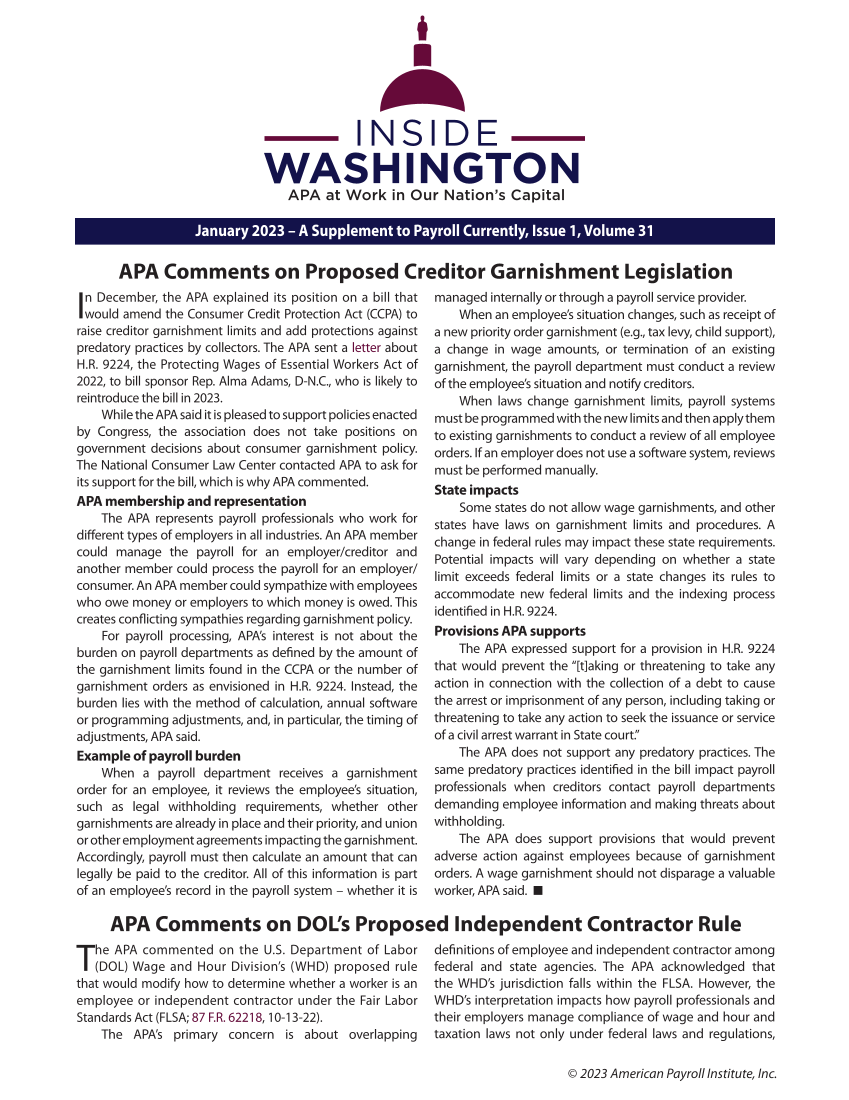© 2023 American Payroll Institute, Inc. APA Comments on Proposed Creditor Garnishment Legislation In December, the APA explained its position on a bill that would amend the Consumer Credit Protection Act (CCPA) to raise creditor garnishment limits and add protections against predatory practices by collectors. The APA sent a letter about H.R. 9224, the Protecting Wages of Essential Workers Act of 2022, to bill sponsor Rep. Alma Adams, D-N.C., who is likely to reintroduce the bill in 2023. While the APA said it is pleased to support policies enacted by Congress, the association does not take positions on government decisions about consumer garnishment policy. The National Consumer Law Center contacted APA to ask for its support for the bill, which is why APA commented. APA membership and representation The APA represents payroll professionals who work for different types of employers in all industries. An APA member could manage the payroll for an employer/creditor and another member could process the payroll for an employer/ consumer. An APA member could sympathize with employees who owe money or employers to which money is owed. This creates conflicting sympathies regarding garnishment policy. For payroll processing, APA’s interest is not about the burden on payroll departments as defined by the amount of the garnishment limits found in the CCPA or the number of garnishment orders as envisioned in H.R. 9224. Instead, the burden lies with the method of calculation, annual software or programming adjustments, and, in particular, the timing of adjustments, APA said. Example of payroll burden When a payroll department receives a garnishment order for an employee, it reviews the employee’s situation, such as legal withholding requirements, whether other garnishments are already in place and their priority, and union or other employment agreements impacting the garnishment. Accordingly, payroll must then calculate an amount that can legally be paid to the creditor. All of this information is part of an employee’s record in the payroll system – whether it is managed internally or through a payroll service provider. When an employee’s situation changes, such as receipt of a new priority order garnishment (e.g., tax levy, child support), a change in wage amounts, or termination of an existing garnishment, the payroll department must conduct a review of the employee’s situation and notify creditors. When laws change garnishment limits, payroll systems must be programmed with the new limits and then apply them to existing garnishments to conduct a review of all employee orders. If an employer does not use a software system, reviews must be performed manually. State impacts Some states do not allow wage garnishments, and other states have laws on garnishment limits and procedures. A change in federal rules may impact these state requirements. Potential impacts will vary depending on whether a state limit exceeds federal limits or a state changes its rules to accommodate new federal limits and the indexing process identified in H.R. 9224. Provisions APA supports The APA expressed support for a provision in H.R. 9224 that would prevent the “[t]aking or threatening to take any action in connection with the collection of a debt to cause the arrest or imprisonment of any person, including taking or threatening to take any action to seek the issuance or service of a civil arrest warrant in State court.” The APA does not support any predatory practices. The same predatory practices identified in the bill impact payroll professionals when creditors contact payroll departments demanding employee information and making threats about withholding. The APA does support provisions that would prevent adverse action against employees because of garnishment orders. A wage garnishment should not disparage a valuable worker, APA said. APA Comments on DOL’s Proposed Independent Contractor Rule The APA commented on the U.S. Department of Labor (DOL) Wage and Hour Division’s (WHD) proposed rule that would modify how to determine whether a worker is an employee or independent contractor under the Fair Labor Standards Act (FLSA 87 F.R. 62218, 10-13-22). The APA’s primary concern is about overlapping definitions of employee and independent contractor among federal and state agencies. The APA acknowledged that the WHD’s jurisdiction falls within the FLSA. However, the WHD’s interpretation impacts how payroll professionals and their employers manage compliance of wage and hour and taxation laws not only under federal laws and regulations, January 2023 – A Supplement to Payroll Currently, Issue 1, Volume 31
Printed for: PayrollOrg Bookshelf © 2024 American Payroll Institute, Inc. All Rights reserved. From: PayrollOrg Digital Publications (bookshelf.payroll.org)


